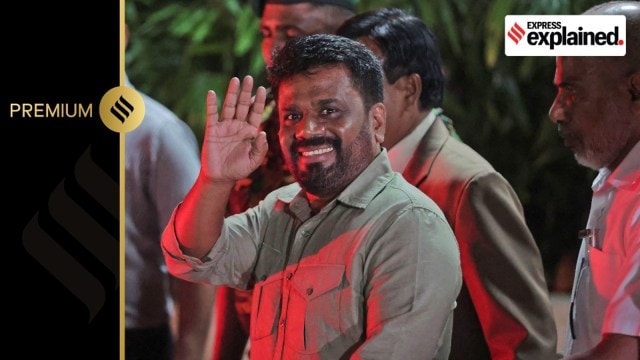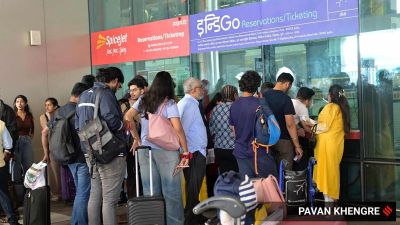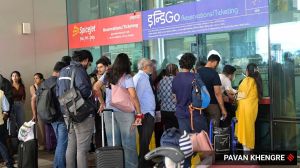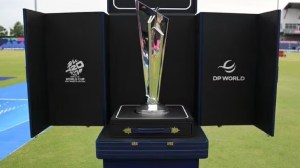How Marxist Anura Kumara Dissanayake won Sri Lanka’s Presidency, erasing a violent past, balancing class struggle and pragmatism
A son of the soil image and dissatisfaction with traditional political parties that have ruled Sri Lanka for over seven decades have buoyed Anura to victory. All eyes are now on how he and his party adapt to the big stage.
 Anura Kumara Dissanayake, leader of the National People's Power (NPP) party, greets as he leaves the election commission after he claimed the victory in the presidential election, in Colombo, Sri Lanka. (Reuters)
Anura Kumara Dissanayake, leader of the National People's Power (NPP) party, greets as he leaves the election commission after he claimed the victory in the presidential election, in Colombo, Sri Lanka. (Reuters)Anura Kumara Dissanayake, 55, has become a symbol of political transformation in Sri Lanka, rising from a humble rural background to claim the country’s presidency in a groundbreaking election. Anura secured 42.31% of the vote, while Sajith Premadasa followed with 32.71%, and the incumbent president, Ranil Wickremasinghe, garnered just 17.27%.
Born on November 24, 1968, in Galewela, Anura’s early life was marked by his deep connection to the struggles of Sri Lanka’s rural heartland. Unlike many other dynastic or aristocratic leaders rooted in majority Sinhala Buddhist politics, it was not academia or racial-ethnic identity that shaped his future.
While in university in the early 1990s, his growing political activism drew him to the Janatha Vimukthi Peramuna (JVP), a left-wing Marxist-Leninist party that was characterised by armed uprisings in 1971 and 1987-89 and represented the oppressed Sinhalese rural youth. The violent insurrections led by the JVP were fuelled by a hardline Marxist ideology aimed at overthrowing the existing political and economic systems, which they viewed as exploitative and feudalistic.
But Anura’s evolution as a political leader happened when JVP witnessed a shift to democratic politics, indicating the softening of Marxist goals, adapting to political realities rather than a complete abandonment of their ideological roots.
Rise of Anura Kumara Dissanayake
Anura’s political ascent began in 1997 as the national organiser of the JVP’s Socialist Youth Organization. By 2000, he became an MP, eventually leading the JVP in 2014. His background in Sri Lanka’s rural agricultural sector, including a brief role as Minister of Agriculture in 2004, shaped his connection to the country’s working class, setting him apart from the political elite.
After JVP’s violent insurrections, in 1971 and again in the late 1980s, were brutally crushed by the government, leaving deep scars on the nation, its image was associated with militancy and bloodshed rather than governance for many years. Anura taking over the leadership in 2014 marked a turning point for the party. While his predecessor, Somawansa Amarasinghe, guided the JVP through its rehabilitation from the ashes of the 1989 insurrection, steering it away from armed struggle to parliamentary politics, Anura is credited with modernising the party’s image, broadening its appeal to younger voters and rebranding the JVP as a voice against corruption and political patronage.
While the JVP saw itself as a class-based movement, focused on eliminating feudalism and imperialism, Anura’s focus on economic issues, particularly the plight of Sri Lanka’s rural and working-class citizens, resonated deeply as the country faced worsening economic crises in the late 2010s and early 2020s.
His candidacy was buoyed by widespread anger at Sri Lanka’s political elite, who have been blamed for the country’s economic collapse, characterised by skyrocketing inflation, food shortages, and mounting debt. The fall of the powerful Rajapaksa family in 2022, triggered by massive protests, created a vacuum in Sri Lankan politics, and Anura’s platform of anti-corruption and political reform struck a chord with a weary electorate.
Is his party ready?
It is the first time in decades that a Marxist party will lead Sri Lanka – it is also a remarkable transformation for a group that once operated on the political fringes. What intrigues many now is how much the JVP has truly evolved. Opinions are divided: some express concerns about the party’s readiness to govern, about its inherent militant character, while others are hopeful, seeing potential in the JVP’s gradual shift from its radical past to a more pragmatic, mainstream political force.
A veteran writer and a staunch political critic, who lives in Colombo, agreed to speak to The Indian Express, but on condition of anonymity. He said he is clueless about how sincere JVP cadres are in adapting into a democratic system. “It is completely different from any other party. Within their regimented culture, there is absolutely no democracy, they can’t tolerate criticism. If I say this to a Delhi newspaper, I have reasons to be worried about my safety now,” he said.
The relationship Anura and JVP share with China and India would be another curious matter. The JVP originated from a splinter group within the Communist Party of Sri Lanka (CPSL) in the 1960s, particularly from its pro-China faction, at a period when the global communist movement was split between two major blocs – one aligned with the Soviet Union, which was more reformist and parliamentary socialist in nature, and the other with China, which advocated revolutionary struggle and Maoist principles.
Anura’s and JVP’s Marxist roots and pro-China origins will fuel speculation about their potential closer ties with China under his leadership. However, Anura has already signalled balanced foreign relations, including with India, even though the JVP is known for its aggressive anti-Indian positions in the past.
JVP’s troubled history with India
During the JVP insurrections of the late 1980s, the party vehemently opposed Indian intervention in Sri Lanka, particularly the presence of the Indian Peace Keeping Force (IPKF) sent to help quash Tamil separatists. In fact, the JVP even orchestrated campaigns targeting Indian goods and businesses in Sri Lanka during this period, some even violent, including the assassination of a pharmaceutical company chief in 1989 as part of its violent campaign against individuals and entities perceived as supporters of Indian influence in Sri Lanka.
Bernard Goonetilleke, a former diplomat and head of the Pathfinder Foundation in Colombo, said the JVP has historically been anti-India, especially during the late 1980s, when they led a campaign against Indian imports, including medicines and drugs.
“However, this stance may not define the JVP’s current policies. The party has matured, recognising the importance of engaging with world leaders and adjusting to the global order. Anura himself visited India a few months ago (in February 2024) and met with Indian officials (External Affairs Minister S Jaishankar and National Security Adviser Ajit Doval), signalling a broader, more pragmatic approach in recent years. In the modern world, political course corrections are essential, and the JVP appears to be adapting accordingly,” Goonetilleke said.
The party also had a complex, often antagonistic relationship with Tamil nationalism and LTTE. When the JVP saw itself as a class-based movement in the early years, it did not engage deeply with the demands of Tamil autonomy in Sri Lanka; a period when Tamil nationalism was in its nascent stage. In the 1980s, when Tamil rebels emerged, it saw the Tamil issue from the Marxist perspective of class struggle, and advocated for a unitary state, opposing any form of separatism.
The JVP adopted a staunchly nationalist position against the Tamil rebellion, strongly opposing LTTE’s demands for an independent Tamil Eelam. The party saw the LTTE not just as an ethnic separatist group but as a force that could fragment the country. The JVP also opposed the Indo-Sri Lanka Peace Accord in 1987, which sought to offer a limited autonomy to Tamil-majority areas, and it was also the period when JVP targeted Indian businesses and interests in Sri Lanka. The JVP supported the war against LTTE, and viewed the military defeat as a restoration of Sri Lanka’s territorial integrity.
His ideology
How ‘Marxist’ is Anura? “A pragmatic Marxist,” a close aide of his said at a time when Anura played a key, invisible role behind the massive people’s uprising in 2022 that ousted Gotabaya Rajapaksa from power.
According to Goonetilleke, the JVP rose to prominence due to the failed policies of the established political parties. “Whether Anura remains firmly Marxist is yet to be seen. Historically, the JVP has been a far-left organisation, but Anura’s political stands and speeches in recent years suggests a shift towards the centre. Only time will tell how much of a ‘Marxist’ he is, through his policies,” he said.
The JVP under Anura did embrace democracy, tempered its anti-capitalist stance, and also adopted a more centrist approach while retaining anti-imperialist rhetoric. As a leader, Anura has focused on anti-corruption, governance reform, and nationalism, over classical Marxist ideals like class struggle.
However, what made Anura’s victory possible was his image as the son of the soil. Those who closely observed the election insist that votes for Anura also represent a protest against the traditional political parties that have ruled Sri Lanka for over seven decades, reflecting widespread public dissatisfaction. “
From 2009 to 2024, the JVP rose to prominence due to the failed policies of the established political parties. Also, his victory was facilitated by the split within the United National Party (UNP), where Ranil Wickremesinghe and Sajith Premadasa, once part of the same political faction, ended up competing against each other. Without this split, Anura’s victory wouldn’t have been possible,” said Goonetilleke.
- 01
- 02
- 03
- 04
- 05






































